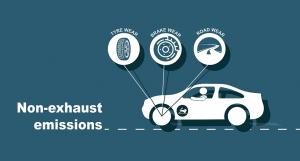
Following strong reduction from exhaust particle emissions (PM 2.5 and 10) over the past 20 years, due to international and national vehicle regulations, non-exhaust sources now make up approximately 80% of particle emissions from vehicle use, compared to some 40% in 2000. Non-exhaust emissions arise from road, tyre and brake wear and road dust resuspension.
UNECE’s World Forum for Harmonization of Vehicle Regulations (WP.29) adopted today groundbreaking regulation to measure emissions from braking systems under repeatable and reproducible laboratory conditions. This is the first regulatory tool in the world to look at non-exhaust particle emissions from cars and vans.
When activating the brake pedal on a motor vehicle, friction between the brake disc and brake pads is generating heat and is slowing down the vehicle. In this process, small parts of the disc and pads are emitted in the form of airborne particles that can be breathed by humans and impact biodiversity and the environment like exhaust particle emissions. However, electric vehicles (EVs) are also equipped with non-friction braking (also called regenerative braking), which recharges the battery when slowing down. Thus, when driving an EV, in most cases non-friction braking is used, drastically reducing emissions from brakes.
The United Nations Global Technical Regulation No. 24 was adopted by Australia, China, European Union, India, Japan, Norway, Russian Federation, South Africa, and United Kingdom. Parties that have adopted or will adopt the proposal commit to transpose it into their national or regional legislation.
Emission ceilings for brake particles will be defined by countries applying the new technical regulation.
In the European Union, the regulation will be used to measure brake particles under the planned Euro7 legislative proposal, which will determine emission ceilings.
The Working Party on Pollution and Energy, which prepared the draft regulation, is currently developing similar methodology for heavy-duty vehicles braking systems.
They are also working on a procedure to measure tyre abrasion, another major source of non-exhaust emissions, with a draft regulation expected in 2025.
Note to editors
The World Forum for Harmonization of Vehicle Regulations, hosted by UNECE, is a unique global platform responsible for the regulatory frameworks regarding the safety and environmental performance of vehicles, their subsystems and parts.
The World Forum manages three Global Agreements on vehicles: 1958 Agreement (UN Regulations); 1998 Agreement (UN Global Technical Regulations); and 1997 Agreement (UN Rules on Periodic Technical Inspections). Any country that is member of the United Nations may participate in the activities of the World Forum and accede to the Agreements.
United Nations Global Technical Regulations (UN GTRs) contain globally harmonized performance-related requirements and test procedures. They provide a predictable regulatory framework for the global automotive industry and consumer associations. They do not contain administrative provisions for type approvals and their mutual recognition.
The Regulation was developed by UNECE’s Working Party on Pollution and Energy (GRPE) and a dedicated group on Particle Measurement Programme (PMP), which prescribes testing procedure and conditions for braking systems.
The Working Party on Pollution and Energy (GRPE) is one of the six subsidiary bodies of the World Forum. It concentrates its work on defining exhaust, energy efficiency and power measurement procedures for all modes of inland transport in order to limit environmental damage. GRPE will be in charge of the development of the UN GTR on real driving emissions testing.

